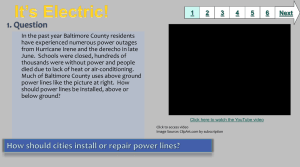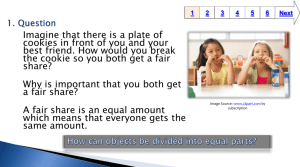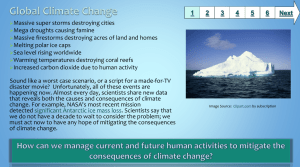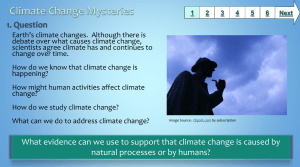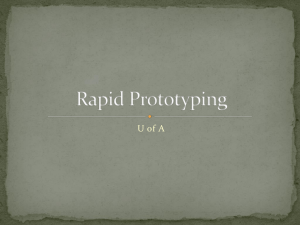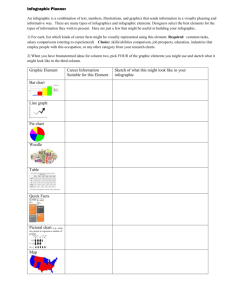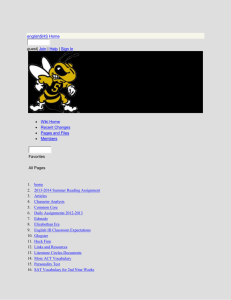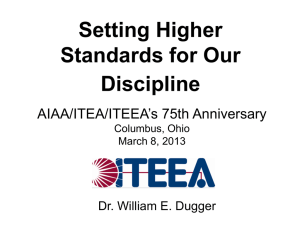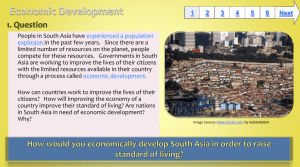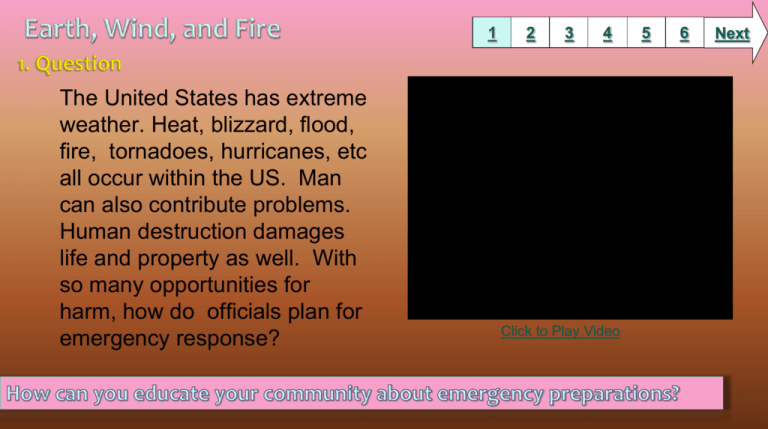
1
The United States has extreme
weather. Heat, blizzard, flood,
fire, tornadoes, hurricanes, etc
all occur within the US. Man
can also contribute problems.
Human destruction damages
life and property as well. With
so many opportunities for
harm, how do officials plan for
emergency response?
2
3
4
Click to Play Video
5
6
Next
1
2
3
Collect information from the following
resources. You will be using this knowledge
to complete an activity on slide 3. You may
use wallwisher or another tool to take notes.
Digital resources:
FEMA's Ready Website
Are you prepared?
Citizen Corps Resources
Maryland Emergency Plans
Image Source: ClipArt
4
5
6
Next
1
2
3
4
5
6
Next
Please use the web infographic and
your notes from the previous slide
to complete the activity.
Prepare for a Natural Disaster Infographic
Image Source: Reich, Kenneth. "Los Angeles." World Book Student.World Book, 2012. Web. 19 July 2012
Image Source: ClipArt.com
1
2
1.Choose
a type of disaster
2.Create a video, podcast,
Glogster, or product of your
choice to inform and educate
your community. Keep your
audience in mind when creating
your product.
3.Rubric
Examples:
New York Preparedness Videos
Family Emergency Kit Video
Hurricane Glogster
Hot Weather Podcast
Image Source: Original Glogster
3
4
5
6
Next
1
2
3
4
5
6
Next
Check out some videos, articles, and infographics dealing
with emergency response, careers, and college majors.
Click to Play Movie
Image Source:
FEMA Infographic
Emergency Management Specialist Job Video
Presidential Disaster Declaration Map
Emergency Management Jobs in Maryland
UMUC Major in Homeland Security
Penn State Online Master Homeland Security Degree
Baltimore County Emergency Management
1
BCPS Curriculum
Students will describe the nature, characteristics and scope of technology. (2)
Students will design and conduct research related to the nature of technology.
Maryland State Curriculum
Explain that management is the process of planning, organizing, and controlling work. (ITEA, STL 2-EE)
Explain that humans devise technologies to reduce the negative consequences of other technologies. (ITEA,
STL 5-K)
Document processes and procedures and communicate them to different audiences using appropriate oral and
written techniques. (ITEA, STL 12-L)
Common Core State Standards
Reading: 1. Read closely to determine what the text says explicitly and to make logical inferences from it; cite
specific textual evidence when writing or speaking to support conclusions drawn from the text.
Writing: 7. Conduct short as well as more sustained research projects based on focused questions,
demonstrating understanding of the subject under investigation.
Standards for the 21st Century Learner
1.1.6 Read, view, and listen for information presented in any format (e.g. textual, visual, media, digital) in order
to make inferences and gather meaning.
2.1.3 Use strategies to draw conclusions from information and apply knowledge to curricular areas, real-world
situations, and further investigations.
NETS Standards
3. Research and Information Fluency: Students apply digital tools to gather, evaluate, and use information.
a. Plan strategies to guide inquiry
b. Locate, organize, analyze, evaluate, synthesize,
and ethically use information from a variety of
sources and media
c. Evaluate and select information sources and digital
tools based on the appropriateness to specific tasks
2
3
4
5
6
Time Frame: Two 50 minute periods
Differentiation:
Direct students to use comprehension tools included
in databases, such as: audio read-aloud, labeled
reading levels, and embedded dictionaries.
Students will choose their own product
Learning Styles: Visual, Auditory, Kinesthetic, Tactile,
Reflective, Global, Analytical
Notes to the teacher:
If using Glogster be sure to create student accounts
prior to project. See your LMS if there are questions.
Familiarize yourself with Wallwisher if using.
Adjust rubric to personal specifications.
Familiarize yourself with web 2.0 tools mentioned
Answers to quiz on slide 3
Last updated: July 2012
Created by Alexis Mazur and Sara Saffell
BCPS Slam Dunk Research Model, Copyright 2012, Baltimore County Public Schools, MD, all rights reserved. The models may be used for educational, non-profit school use only.
All other uses, transmissions, and duplications are prohibited unless permission is granted expressly. This lesson is based on Jamie McKenzie’s Slam Dunk Lesson module.

